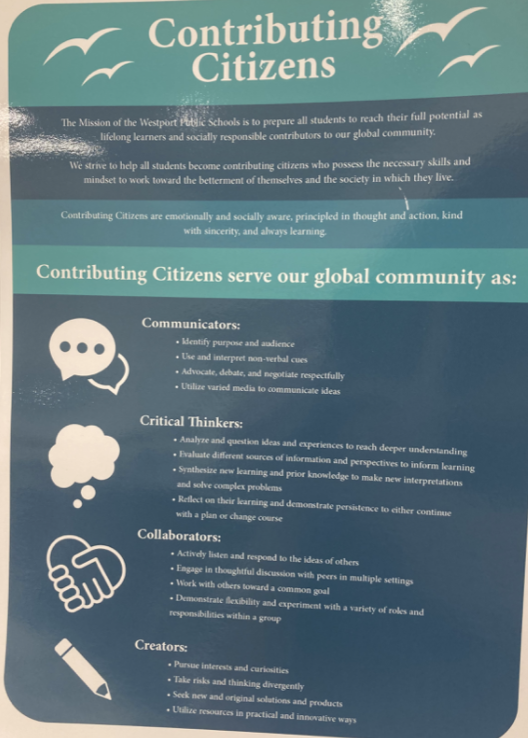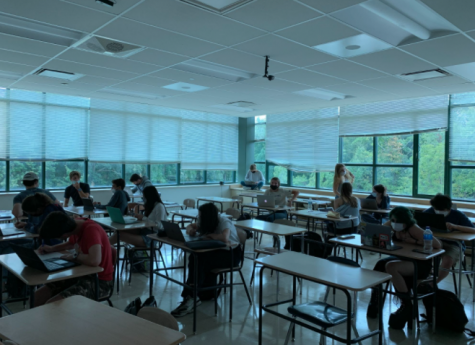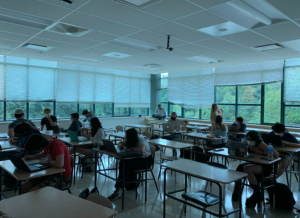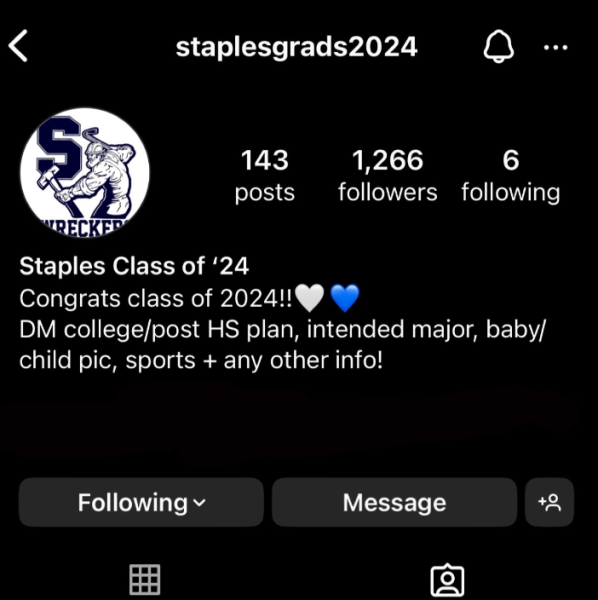Staples’ ‘Vision of the Graduate’ feels out of touch
The Staples vision of the “contributing” graduate includes the traits that they want graduating students to achieve in their time at Staples.These posters are seen posted on the walls across the school.
Maybe you’ve seen them around school. The posters with the words “Contributing Citizens” at the top, outlining four traits that the ideal citizen should have. These posters are part of the new “Vision of the Graduate” initiative, a program that aims to cultivate these four traits (or “domains”, as they are officially referred to) in the graduating students of Staples.
The new initiative is now a focal point in Connections class. Staples administration is using the Connections period to explain these four domains and how they relate to the new graduation requirements. These graduation requirements will require students graduating in 2023 or later to submit a collection of projects they have undertaken over their time at Staples, officially called a “mastery-based diploma”. As it stands, these domains feel confusing and out of touch, and the lack of communication to students about what this project really is has only exacerbated the problem.
For starters, the mastery-based graduation requirement was announced some time last year, despite the fact that we are only now finding out what it actually entails. Though I understand that COVID has made management in many areas more difficult, having an unexplained, unclear and large graduation requirement thrust upon us out of the blue was not ideal.
If the school wants students to care about communication, then flatly reading out confusing buzzwords to them followed by a boring, non-engaging activity is not the way to go.
— Ryan Hong '23
Second, though we are finally learning about the vision of the graduate and the mastery-based diploma through Connections class, the manner in which it is presented is frankly somewhat baffling to me.
The school obviously wants students to care about these new requirements, as they have already devoted several Connections classes to the subject and plan to spend several more on them. However, the way in which they attempt to get students invested in these requirements leads me to believe they didn’t have a very good grasp on their audience.
Presentations are littered with confusing buzzwords that sound nice, but don’t actually explain anything. Even the name “mastery-based diploma” feels like a buzzword. What is “mastery-based diploma” actually supposed to mean? How is it a diploma? What is it based on the mastery of?
Words like these make understanding the program very difficult for the student body and can cause confusion. Students shouldn’t have to learn the definition and proper usage of a dozen different words to understand the Vision of the Graduate.
Furthermore, the activities that various Connections classes use to explain the importance of these traits to students reveals the lack of understanding the administration has for the way students connect with their work. The goal of these activities is to explain how domains included in the diploma, such as communication, are important in everyday life.
Activities involve games related to nonverbal communication such as charades, as well as having an open discussion of times when good communication skills have been useful. However, these activities have failed to encourage students to care about this domain because there is nothing that will make them care.
Many students approach school with the mindset that they only participate because it is required. Since Connections class is not graded, students have very little incentive to participate in these activities, and since they didn’t care about the topics to begin with, the activities will fail to get through to and connect with the students.
If the school wants students to care about communication, then flatly reading out confusing buzzwords to them followed by a boring, non-engaging activity is not the way to go.
While looking through the document where the discussion questions are outlined for teachers, I also noticed that a “written reflection” is referenced at the bottom. I strongly hope the administration doesn’t plan to require students to write a reflection on these topics.
A reflection is one of the most boring and menial activities possible, and will promote very little thought beyond what is required to write the most basic-surface level paper possible. Forcing students to write an essay about the importance of the domains will, at best, fail to make them care, and at worst make them actively despise the idea.
If students caring about the program is important to the administration, I would suggest that they use language students can connect to. Drop the technical jargon and the broad, sweeping terms and have an actual conversation about what the Vision of the Graduate is and what it means. Reduce guidelines for what teachers should say and do in Connections class, and let the teachers decide how best to get through to students. This will encourage actual conversations, instead of the artificial discussions that happen in Connections classes.
I sympathise with the efforts of administrations to introduce these concepts, especially while trying to juggle the challenges COVID-19 that still affect our regular school life. Even so, if their goal is for students to become invested in the vision of the graduate, the current plan simply won’t cut it.

Although Staff Writer Ryan Hong ’23 seems to have a full schedule with hours spent dabbling at chess and mastering the bass guitar, he always makes sure...

Although Staff Writer Ryan Hong ’23 seems to have a full schedule with hours spent dabbling at chess and mastering the bass guitar, he always makes sure...



























































